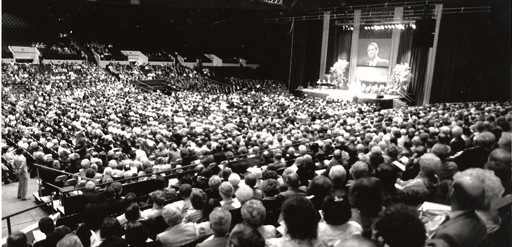The Daniel Vestal attending this week’s Cooperative Baptist Fellowship gathering in Dallas is in some ways a very different Christian than he was the first — or even most recent — time he attended a general assembly.
That’s because the Texas native who served as CBF executive coordinator from 1996 to 2012 said he has undergone numerous and significant cycles of faith deconstruction and reconstruction throughout his life.
“Of course,” he added when asked if that process is continuing. “And I hope it does until I die. I think you should always be growing in your faith and you should always be changing and expanding.”
“I think you should always be growing in your faith and you should always be changing and expanding.”
Chapters of change
Vestal shares many of those pivotal experiences in his new book, This Treasure Within: A Memoir. Its 347 pages offer detailed histories and reflections on child evangelism, his theological education at Baylor University, about lessons learned as a pastor and as an early leader of the moderate cause in the Southern Baptist Convention and the subsequent birth and early years of CBF.
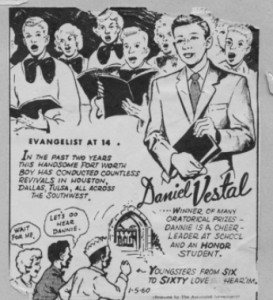
Newspaper ad for Daniel Vestal as a youth evangelist.
Each of those and other chapters of his faith and life either followed or preceded periods of deep spiritual introspection and new self-understandings of calling, Scripture and church, Vestal said. And they began early with doubts about his childhood conversion and theology.
“What was missing from the theological soil of my childhood and adolescent faith were ingredients of critical reflection, serious study and honest doubt. These elements were not considered helpful to the central mission of the church, and many were convinced they could hinder it,” he writes in a section about doubt and faith reconstruction. “There was an implicit anti-intellectualism in my heritage, as well as a fear of academic study.”
Vestal writes that, at Baylor, he was not the first to struggle with doubt, and that doubting, while often painful, was part of spiritual growth. Meeting fellow travelers in that journey also helped, as did encounters with encouraging professors and with the charismatic and Pentecostal movements.
“I still called sinners to repent and be converted, but I increasingly called on converted sinners to live like saints and celebrate their salvation and indwelling Spirit.”
“As I gained assurance and consolation, the content and style of my preaching was changing. I still called sinners to repent and be converted, but I increasingly called on converted sinners to live like saints and celebrate their salvation and indwelling Spirit. My preaching was still evangelistic, but it was also becoming more pastoral. Theological transformation was taking place, although I didn’t have the vocabulary to fully describe it.”
Change in understanding Scripture
Vestal also underwent a transformation of his view of Scripture. Namely, his understanding moved from one he described as “simple biblicism” to seeing the Bible as a collection of ancient texts composed from different historical and theological perspectives.
“I never lost my faith in the divine inspiration of these documents, but I did lose faith in a simplistic way of reading and interpreting them,” he writes. “I also lost faith, at least for a while, in many of the accepted interpretations I had received from childhood and became less sure that my own interpretations were correct. Loss of certainty is painful, just as loss of naivete is humbling.”
Influence of Civil Rights movement
More religious deconstruction and reconstruction for Vestal came during the 1960s, when the Vietnam War, Civil Rights movement and assassinations of Robert Kennedy and Martin Luther King, Jr. plummeted the nation into turmoil.
“That was an awakening. It was a conversion. It was a spiritual-social awakening for me that I had not experienced before.”
King’s death in particular was a turning point, Vestal said in reflecting about the book. “That was an awakening. It was a conversion. It was a spiritual-social awakening for me that I had not experienced before. That’s when I dealt with my own issues of racism and living in a bubble.”
He further explains in the memoir: “The events that unfolded that year have been analyzed and televised numerous times, but for me they were life changing. I became awake and aware in ways that were at the time difficult to comprehend.”
Influence of SBC battles
The challenging awakenings for Vestal were to continue during the 1970s and 1980s as fundamentalists campaigned for absolute control of the Southern Baptist Convention. While always a self-described theological conservative, Vestal said he was alarmed by fundamentalist strong-arm tactics around the issue biblical inerrancy. Ultimately, he conceded to run as a moderate for the presidency of the denomination twice, losing at the annual meetings in Las Vegas in 1989 and in New Orleans in 1990.
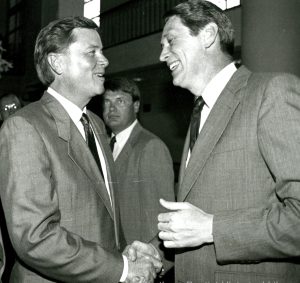
Daniel Vestal (right) congratulating Morris Chapman, who defeated him in the race for SBC president in 1990. (Southern Baptist Historical Library and Archives)
Participating in high-profile, rancorous denominational politics ushered in yet another shift in self-understanding — as did subsequently leaving the SBC to help in the 1991 launch of CBF. “Moving from pastor to denominational leader, that was a deconstruction in terms of vocation because I was no longer a pastor of a congregation. That was a major transformation.”
Life in the Fellowship brought more challenges, he added. “I had to deal with my own view of women’s ordination because, at the time, I didn’t believe in women as deacons or pastors. That was a change.”
‘The very nature of the gospel itself’
Further transformations have occurred in the past 20 years or so, including Vestal’s understanding “of the very nature of the gospel itself. The gospel, as I understood it in my earlier years, was primarily about getting to heaven when you died. It was really about not going to hell. I still believe in a heaven and hell, but now I consider the gospel to be about the good news of Christ’s kingdom and that we are instruments of that kingdom. It’s much grander, richer and fulfilling than just going to heaven or not going to hell.”
“Now I consider the gospel to be about the good news of Christ’s kingdom and that we are instruments of that kingdom. It’s much grander, richer and fulfilling than just going to heaven or not going to hell.”
More recent deconstruction and reconstruction were inspired during a stint as the bivocational pastor at Peachtree Baptist Church in Atlanta and currently as a professor of Baptist leadership at Mercer University in Macon, Ga.
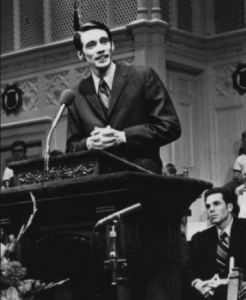
Daniel Vestal speaking at First Baptist Church of Dallas in 1970. That’s Roger Staubach sitting behind him.
“Being the pastor of a multicultural congregation that was 40% nonwhite gave me a deeper understanding of the importance of racial justice,” he explained. “I always felt a commitment to reconciliation, but the experience at Peachtree, teaching at Mercer and the emergence of the Black Lives Matter movement heavily impacted me and convinced me I needed to deal with systemic racism in a much deeper way.”
A renewal movement
Vestal added that he sees now that the evolution in ministry and thinking he has experienced were part of his calling. His experience with CBF was one example of that.
“When I left (the SBC), I really left and believed and felt CBF was a renewal movement. It was God bringing good out of bad. I had a conviction that this was what God wanted me to do. And that gave me an inner peace and strength. That was the conviction that anchored me.”
There also was a sense of the familiar for Vestal in his new life and ministry with CBF, he explained, because it drew on his formative experiences as an evangelist.
“When I was in CBF, I was in a lot of churches. I probably preached 30 weeks out of the year. And I did a lot of international travel. In some ways, that itinerant preaching early on was a help to me. I also had been a pastor almost 30 years and I felt a shepherding impulse to lead (CBF) in a pastoral way, to lead the organization in a spirit of pastoral care. Staff were important. Missionaries were important. This was not just about a CEO of an organization. My experiences as an evangelist and as a pastor were helpful.”
Vestal said it has been gratifying to see the Fellowship continue as a Baptist renewal movement.
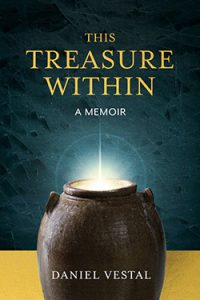 “CBF is a very important ecclesial body of Baptist Christians and for the Christian church, and I think it will have a very important role to play in terms of resourcing congregations and connecting congregations and having ways to develop leaders, both lay and clergy,” he noted. “And it will continue being a powerful voice in social justice and ecumenical efforts and interfaith dialogue.”
“CBF is a very important ecclesial body of Baptist Christians and for the Christian church, and I think it will have a very important role to play in terms of resourcing congregations and connecting congregations and having ways to develop leaders, both lay and clergy,” he noted. “And it will continue being a powerful voice in social justice and ecumenical efforts and interfaith dialogue.”
Vestal said he wrote his memoir to provide hope for individuals and families living through difficult times. “We are very much the treasure in earthen vessels that Second Corinthians chapter four describes. We are certainly troubled on every side, but we need not be perplexed. We are persecuted, but we mustn’t give up. My story is about one imperfect vessel, but the treasure is within me. This is the good news of the living Christ and the encouragement I want to give.”
Related articles:
A quarter-century after the SBC holy war | Opinion by Marv Knox
As Vestal retires, CBF ponders future

